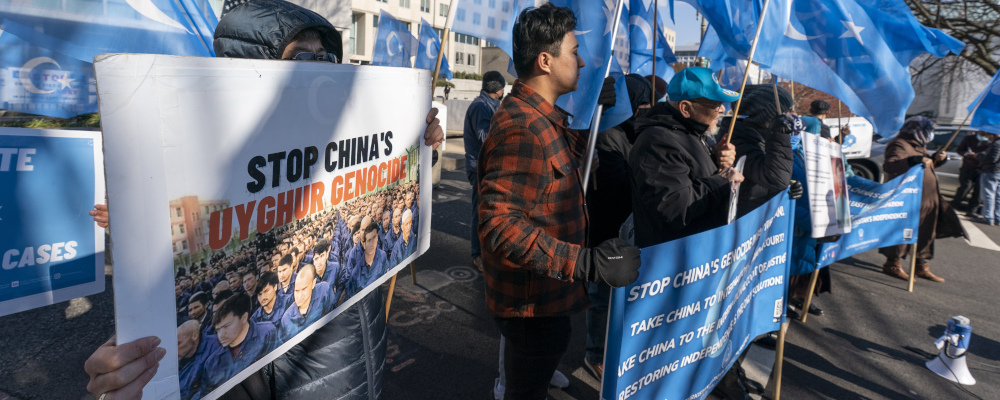Two words to chill Canadian hearts appear in the Sept. 1 United Nations report on the human rights situation in Xinjiang: “residential” and “school.”
The document confirms the worst that has been reported since the New York Times first broke the story in November of 2019 about a large network of prison-like camps maintained in western China for the purpose of “re-educating” Uyghurs and other Islamic ethnic minorities.
Just as Canada’s first Prime Minister John A. Macdonald believed that Indigenous cultures rendered Canada’s native peoples intractable to the norms of an emerging modern commercial nation so, it seems, does China’s President Xi Jinping hold that Islam per se fosters violent opposition to China’s secular Marxist state: “As soon as you believe in it,” Xi said in one of the secret party leadership speeches leaked to the New York Times, “it’s like taking a drug, and you lose your sense, go crazy and will do anything.”
Xi shares Macdonald’s view, moreover, that the best antidote to such cultural intoxication is to forcibly separate susceptible individuals from kin and community. The state program of “de-extremification” compels Uyghurs and other Chinese Muslims to reside away from home for a time in barbed-wire compounds under armed guard while Chinese Communist Party values are instilled by the harshest of means.
Comparative cultural genocide is a bleak study, but as is so often the case, Chinese demographics dwarf Western ones. Whereas roughly 160,000 Indigenous people were sent to Canadian residential schools in the 110 years of their institutional life span, the UN estimates that between 1 and 2 million people, possibly as much as 20 percent of the population of Xinjiang, underwent residential “retraining” between 2017 and 2019.
China claims to have since closed the centres, presumably due to international pressure. But the new UN paper shockingly reports that since 2019 the number of Xinjiang residents incarcerated in conventional prisons has risen in direct proportion to the numbers putatively no longer detained in re-education camps.
In the Chinese camps the period of residence has been comparatively brief — anywhere from two to eighteen months, depending on the perceived depth of the person’s “subjective malice” towards the state. And in China the residents are adults rather than the growing children who were so cruelly uprooted and re-educated in Canada. But the methods used in China have been intensive, violent, and technologically enhanced — drawing upon, in Xi’s own words, “all the organs of dictatorship.”
The UN report relates horrific details supplied by former residents about frequent torture, systematic rape, sexual assault with electric wands wielded by police guards, forced labor, compulsory sterilization, and required ingestion of pills that produce a kind of brain fog. Perhaps needless to say, residents have not been permitted to read the Koran, to say prayers, to grow beards, or to observe any Muslim rituals. They are instead made to sing “red songs” for hours on end: “We were forced to sing patriotic song after patriotic song every day, as loud as possible and until it hurts, until our faces become red and our veins appeared on our face.” Even after leaving the camps, the former residents and their families have been required to periodically host protracted visits to their homes by new “family” members delegated by the state to ensure continuing fidelity to “correct” ideas, values, and behaviours.
All these horrors have been perpetrated in the name of schooling. An Orwellian web of wooden education euphemisms seems to have reached as far and wide as the network of watch-towered camps. The residences themselves are called “Vocational Education Training Centers.” In a government white paper and in response to UN questions, the Chinese government characterized them as “schools by nature,” which “deliver a curriculum.”
To be forced to go them is to be sent “to study.” The prevailing Maoist pedagogical approach goes heavy on “political teachings” and “rehabilitation by self-criticism.” Gratitude is stipulated as the appropriate response for “this chance for free education that the party and government has provided to thoroughly eradicate erroneous thinking.” To come out alive from this traumatizing ordeal of cultural erasure is to “graduate.”
The response by the Canadian government and leading Canadian institutions to disclosures about Canada’s residential schools has been robust, if tragically belated. The Truth and Reconciliation Commission has initiated something of a national reckoning on the matter, especially in schools and universities. But the response to the Xinjiang situation has been far less fulsome, notwithstanding its scale, severity, and comparative temporal immediacy.
Prime Minister Justin Trudeau did publicly scold China when word first got out; several Chinese officials were sanctioned; and in early 2021 parliament voted unanimously to “chastise” China for nothing less than “genocide.” But public discussion soon got mired in semantics when Trudeau himself voiced reluctance to apply the term “genocide,” and little has been said publicly about the new UN report’s authoritative confirmations of appalling, large-scale, and ongoing human rights crimes.
Such comparative reticence prompts a difficult question. Is there not some inconsistency, not to say hypocrisy, in performing ceremonials of public remorse about human rights crimes committed in the past while responding cautiously to similar offenses being committed in the present on a far larger scale, albeit in distant places?
As a significant trading partner with China and as the university educator of large numbers of Chinese citizens, Canada would seem to be in a position not only to speak out, but to actively intervene in a more meaningful way. Any policy decision affecting Chinese trade carries weight with China’s leadership, and the Chinese upper classes would certainly take notice if deprived of a preferred option for educating their children abroad. Could it be that ever-increasing dependence on China’s money is inhibiting Canada’s response?
Readily available public figures show that China is Canada’s second leading trade partner and trending upward. And nearly 20 percent of University of Toronto’s annual revenue, to speak of just one large Canadian university, comes from the more than thirteen thousand Chinese nationals who are paying the full $60,000 tuition charged to international students.
Hesitancy to reconsider such economically advantageous relationships is understandable from a purely pragmatic point of view. But in the context of the Truth and Reconciliation Commission, whose report calls for “virtually all aspects of Canadian society…to be reconsidered,” such reserve seems starkly morally compromising. And the compromise will become yet more discomfiting in the not unlikely event of a Chinese invasion of Taiwan and the ensuing “sinification” of its people advocated by hardline Chinese scholars.
Will University of Toronto, for example, be able to speak out properly if China threatens to abruptly deprive this great institution of 20 percent of its revenue by recalling its students overnight?
The reports from Xinjiang provide a horrifying preview of just what the “sinification” of Taiwan might look like. And they provide a portrait of President Xi as a leader at ease with such brutal dictatorial measures. It would be better for Canada to begin to speak and act now than to atone again when it’s too late.
Recommended for You

The Notebook by Theo Argitis: Carney’s One Big Beautiful Tax Cut, and fresh budget lessons from the U.K.

Ginny Roth: How vacant liberal nationalism left Canada worse off than George Grant even imagined

Peter Menzies: Justin Trudeau’s legislative legacy is still haunting the Liberals

‘You have to meet bullying with counter-bullying’: David Frum on how Canada can push back against Trump’s trade negotiation tactics



